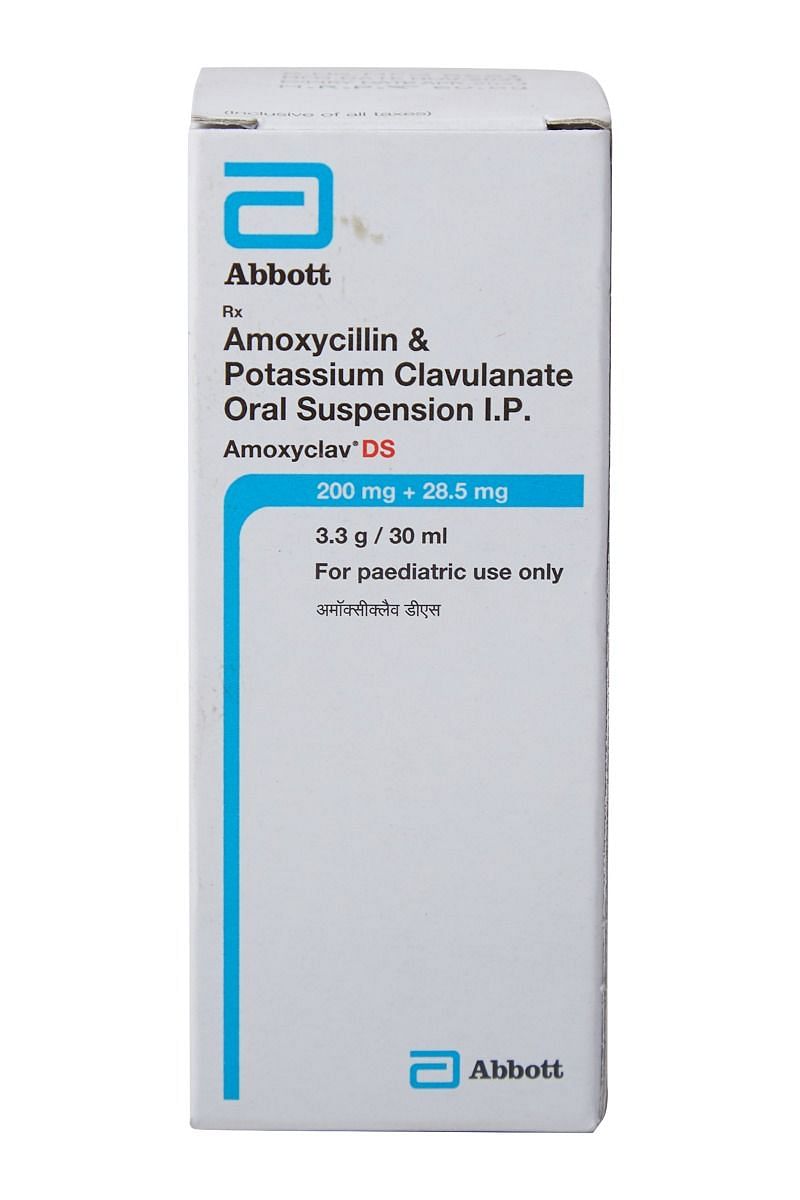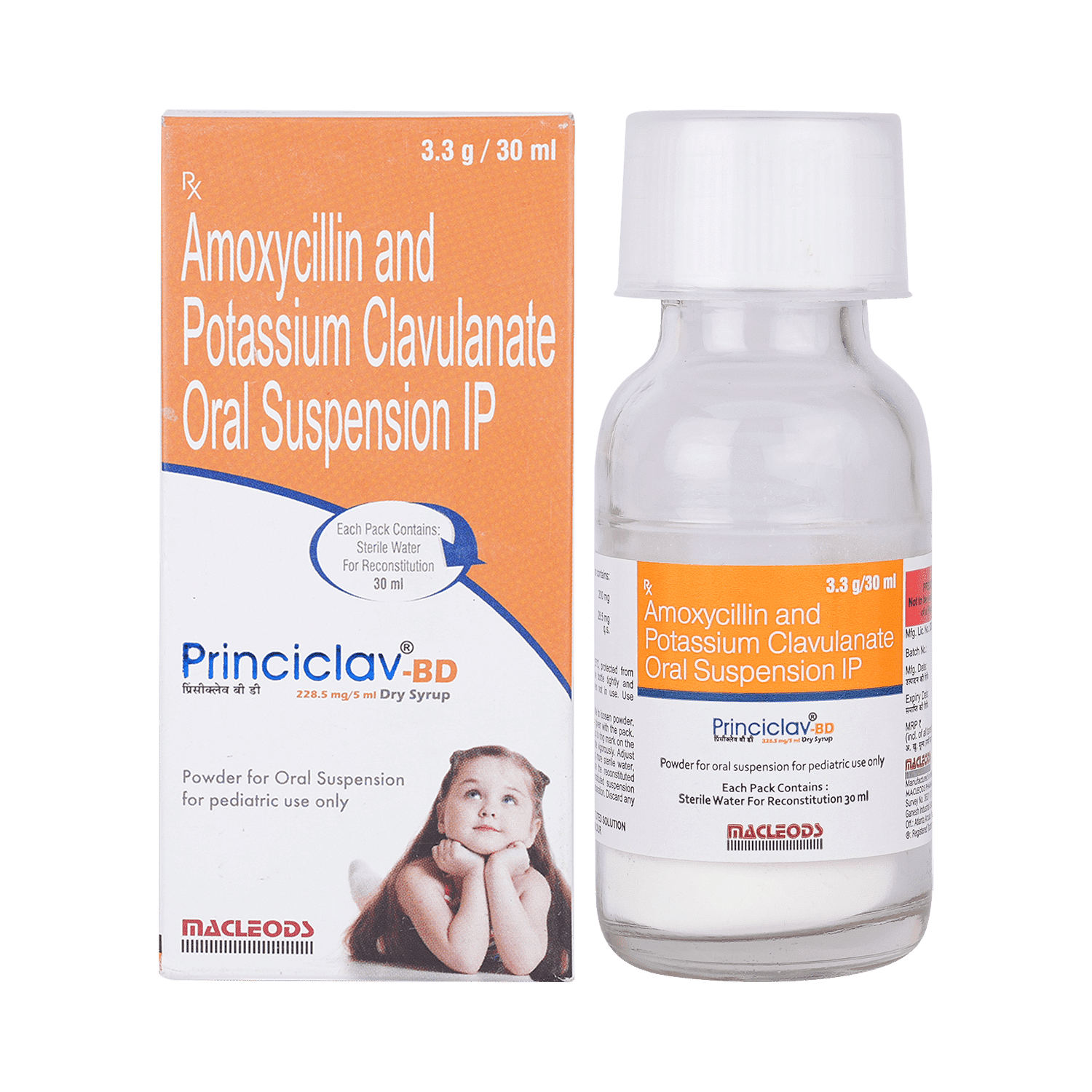
Digimox CV Dry Syrup
Manufacturer
Rosswelt Biosciences
Salt Composition
Amoxycillin (200mg) + Clavulanic Acid (28.5mg)
Key Information
Short Description
Digimox CV Dry Syrup is an antibiotic medicine that helps treat bacterial infections of the ear, nose, throat, chest, lungs, teeth, skin, and urinary tract.
Dosage Form
Dry Syrup
Introduction
Digimox CV Dry Syrup is an antibiotic medicine that helps treat bacterial infections of the ear, nose, throat, chest, lungs, teeth, skin, and urinary tract. It is capable of killing bacteria that have become resistant to other therapies and thus also helps treat tuberculosis that is resistant to other treatments.
Directions for Use
Your child must complete the entire course of antibiotics. Stopping too soon may cause the bacteria to multiply again or cause another infection.
Safety Information
Side Effects
No common side effects listed
How it works
Digimox CV Dry Syrup is an antibiotic. It has two active agents amoxycillin and clavulanic acid. Amoxycillin works by preventing the formation of the bacterial protective covering (cell wall) essential for the survival of the bacteria. Whereas clavulanic acid serves a special purpose of inhibiting an enzyme (beta-lactamase) that is produced by resistant bacteria. This makes the combination of amoxycillin and clavulanic acid an effective line of treatment for many types of infections.
Quick Tips
Your child must complete the entire course of antibiotics. Stopping too soon may cause the bacteria to multiply again or cause another infection. Your child may have a bitter taste in the mouth after the intake of Digimox CV Dry Syrup. Eating citrus fruit or sipping plenty of water or fruit juice may help. Encourage your child to drink plenty of water in case diarrhea develops as a side effect. Never give Digimox CV Dry Syrup until and unless prescribed by the doctor. Do not give Digimox CV Dry Syrup to treat common cold and flu-like symptoms caused by viruses. Never save medicine for future illnesses. Check ‘expiry’ before giving Digimox CV Dry Syrup to your child. Immediately discard all the expired medicines. Stop Digimox CV Dry Syrup immediately if your child develops an itchy rash, facial swelling, or breathing difficulty. Report to the doctor without any delay.
Related Medicines

Moxikind-CV Dry Syrup

Advent 228.5mg Dry Syrup Tangy Orange

Amoxyclav Dry Syrup

Mpx-CV Dry Syrup

Moxilink C Dry Syrup

Moroxil CV Dry Syrup

Clavica Dry Syrup

Xylum Dry Syrup

Princiclav -BD Dry Syrup

Eradiclav Duo Dry Syrup
Frequently asked questions
Can other medicines be given at the same time as Digimox CV Dry Syrup?
It is crucial to inform your child's doctor about any other medications or supplements your child is taking before starting Digimox CV Dry Syrup. Consulting with a healthcare professional for guidance is essential.
Can I get my child vaccinated while on treatment with Digimox CV Dry Syrup?
Generally, antibiotics do not interfere with the components of vaccines or cause adverse reactions in children who have recently received them. However, it's important to consult your child’s doctor before administering any medication after an illness. Once your child recovers from the underlying condition, they can receive a vaccine following a healthcare professional's recommendation.
Which lab tests may my child undergo while taking Digimox CV Dry Syrup on a long-term basis?
Periodically monitoring kidney and liver function through blood tests is typically recommended for prolonged treatment with Digimox CV Dry Syrup to ensure your child's health remains stable.
Can I give a higher than the recommended dose of Digimox CV Dry Syrup to my child?
It is not advisable to exceed the prescribed dosage of Digimox CV Dry Syrup. Doing so could increase the risk of potential side effects. If your child's symptoms worsen, consult with their doctor for further evaluation and appropriate adjustments to the treatment plan.
Can I stop giving Digimox CV Dry Syrup to my child when the symptoms are relieved?
No, you should not discontinue Digimox CV Dry Syrup prematurely. It is essential to complete the entire prescribed course of medication even if your child's symptoms improve before full recovery. This ensures that the medicine continues to exhibit its potential benefits.
Can the use of Digimox CV Dry Syrup cause diarrhea?
Digimox CV Dry Syrup may cause diarrhea as a side effect, due to its antibiotic nature. It can also affect the beneficial bacteria in your child's gut and lead to this symptom. Encourage your child to drink plenty of fluids if they experience diarrhoea. Consult your doctor immediately if diarrhoea persists or if you observe any signs of dehydration such as reduced urination with dark-colored and strong-smelling urine. Do not administer additional medication without consulting your physician.
Do all viral common colds result in secondary bacterial infection?
The majority of viral common colds do not typically lead to bacterial infections. It's important to note that antibiotics should only be used for bacterial infections. Consult a healthcare professional about administering antibiotics if the condition warrants their use.
The mucus coming out of my child’s nose is yellow-green. Is it a sign of a bacterial infection?
Yellow or green nasal discharge during a common cold is not always indicative of a bacterial infection and is a normal response to the body's immune system fighting off the virus. These changes are typically self-limiting, lasting for 7-10 days.
Is there any sign which shows that my child needs immediate medical attention?
You should immediately contact your child’s doctor if they experience serious allergic reactions (difficulty breathing, skin rashes), gastrointestinal infections (diarrhea), or signs of liver damage (weakness, pallor, vomiting). It's essential to seek professional care immediately for any severe side effects. Though rare, these complications require expert medical attention.


